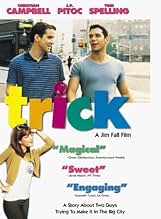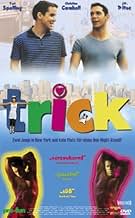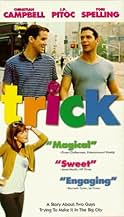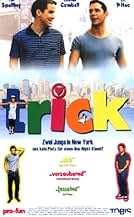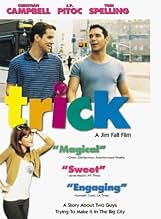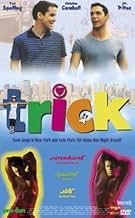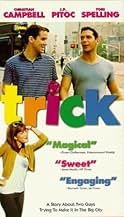NOTE IMDb
7,2/10
9,7 k
MA NOTE
Les mésaventures de deux jeunes hommes gays qui tentent de trouver un endroit où être seuls, une nuit à Manhattan.Les mésaventures de deux jeunes hommes gays qui tentent de trouver un endroit où être seuls, une nuit à Manhattan.Les mésaventures de deux jeunes hommes gays qui tentent de trouver un endroit où être seuls, une nuit à Manhattan.
- Réalisation
- Scénario
- Casting principal
- Récompenses
- 2 victoires et 2 nominations au total
Avis à la une
It's hard to imagine a gay themed film where the main characters aren't drag queens, don't have AIDS, aren't bitchy, catty, flamboyant, tragic or shallow. As it turns out, gay people, like non-gay people, can be all those things (and aren't we all tired of it) and so much more. In fact, the most distinguishing characteristic of gay people is that, for the most part, they are virtually indistinguishable from non-gay people. Isn't it about time a movie just allowed its central gay characters to be a couple of cute young guys whose casual meeting teeters over the course of a hilariously frustrating evening on the verge of becoming more than a one night stand?
Gabriel, played by Christian Campbell, Neve Campbell's older brother, is a shy, aspiring composer with dimples to die for. Mark, J. P. Pitoc, is an outgoing journalism student who earns money as a go-go boy and has the body to prove it. Pitoc and Campbell, who appear together again in the "Thank You, Good Night", gel beautifully as the put-upon would-be lovers. In a world where meeting and having sex can be a rather common and often all too impersonal event, they meet, and like most people their age, they want to have sex. But the story that gently unfolds is not at all common. It's tender, funny, and much more romantic than it sounds.
Tori Spelling, it hurts me to even write this, is terrific as Gabriel's oh-so theatrical friend. She maintains a drama in her life that can be endearing, but is often times more annoying, the latter which Ms. Spelling portrays with great comic success.
The rest of the cast is fairly unremarkable, with two notable exceptions. Steve Hayes is brilliant as a friend from Gabriel's theatre class whose hilarious "Como te gusta mi pinga" is the funniest cabaret number since Priscilla. Clinton Leupp as drag queen Coco Peru, delivers a delightful bathroom soliloquy that will have you in stitches. Even more amusing is the fact that Miss Coco looks distractingly like Ms. Spelling's character, right down to the overabundance of drama.
Trick is an uplifting and life-affirming look at being young and gay and almost in love. Surely you were at least one of these things once.
Gabriel, played by Christian Campbell, Neve Campbell's older brother, is a shy, aspiring composer with dimples to die for. Mark, J. P. Pitoc, is an outgoing journalism student who earns money as a go-go boy and has the body to prove it. Pitoc and Campbell, who appear together again in the "Thank You, Good Night", gel beautifully as the put-upon would-be lovers. In a world where meeting and having sex can be a rather common and often all too impersonal event, they meet, and like most people their age, they want to have sex. But the story that gently unfolds is not at all common. It's tender, funny, and much more romantic than it sounds.
Tori Spelling, it hurts me to even write this, is terrific as Gabriel's oh-so theatrical friend. She maintains a drama in her life that can be endearing, but is often times more annoying, the latter which Ms. Spelling portrays with great comic success.
The rest of the cast is fairly unremarkable, with two notable exceptions. Steve Hayes is brilliant as a friend from Gabriel's theatre class whose hilarious "Como te gusta mi pinga" is the funniest cabaret number since Priscilla. Clinton Leupp as drag queen Coco Peru, delivers a delightful bathroom soliloquy that will have you in stitches. Even more amusing is the fact that Miss Coco looks distractingly like Ms. Spelling's character, right down to the overabundance of drama.
Trick is an uplifting and life-affirming look at being young and gay and almost in love. Surely you were at least one of these things once.
Gay romantic comedies seem to fall into two different categories: either they deal with AIDS specifically, or they don't. TRICK falls into the latter category. Films in the former category tend to be too heavy-handed to be good (save JEFFREY and LOVE! VALOUR! COMPASSION!). Here, screenwriter Jason Schafer focuses not on AIDS whatsoever. In fact, it is never mentioned once. Instead, we watch as two men (wonderfully played by Christian Campbell and John Paul Pitoc) try to have a one-night stand. The only problem: they have no place to go. As these two men desperately try to find a room, fate interferes, allowing them to get to know each other before consumating the relationship. Tori Spelling is terrific in a supporting role, but it is the two leads who must manage this film, and they do with astonishing realism. It's a modern-day, gay fairy tale. It's the type of film that makes you laugh, cry, and feel good in the end. Hollywood could learn something from this small independent feature.
As a genre still virtually in its infancy, the `gay romantic comedy' (a term that sure doesn't mean what it used to) unquestionably has a long way to go to catch up to its heterosexual equivalent. With `Trick,' this process takes a few giant steps forward. This may not be the crossover film many right-minded people might wish it to be, but it goes a long way towards showing that there is actually a benefit to making gay-themed romantic films. Viewing romance from a gay perspective, in and of itself, helps to refresh some of the staleness that has inevitably seeped into the genre over decades of straight variants on the subject. Even though the particulars may be different, the universals remain the same yet, somehow, it is those very differences that make us take a second look at the conventions in fresh and exciting ways. For instance, I defy anyone to come up with a more purely romantic and emotionally uplifting scene than the final extended tracking shot of this film. No film in recent memory has more beautifully captured the pure, life-transforming moment of dawning love better than this one does in that special extended moment at the end. It reminds us of just how intensely straight love stories used to move us, long before they became tired and we became cynical.
As in most movie comedy romances, the plot of the film is a very simple one. Gabe is a shy, almost socially backward young musical comedy composer, living in Greenwich Village with a straight roommate who makes Gabe sleep outside while he, himself, entertains, seemingly on a nightly basis, a parade of willing young ladies. Though Gabe frequents gay bars, he seems unable to find a comfortable niche in the high-speed gay world he finds there. Then, one night, Gabe meets on the subway his virtual opposite, a muscular hunk named Mark who works as a `go-go boy' at a local bar and who exudes the kind of raw sexuality and high-stepping confidence that makes him attractive to many of the area's men including, not so incidentally, Gabe as well. The hook of the film is that Gabe and Mark, once they acknowledge their mutual attraction to each other, are constantly thwarted in their attempts at finding a place to consummate their one-night-stand and, that, as the night wears on and a new day dawns, they both discover that their feelings for each other have deepened considerably beyond mere casual physical attraction and immediate sexual need.
One of the factors that lends depth to this film and makes it more than just mere romantic puffery is that it does not deny the reality of its context. It deals head-on with the issue of casual sex vs. committed relationships while remaining lighthearted and non-judgmental in the process. Moreover, writer Jason Schafer and director Jim Fall demonstrate an ear for naturalistic speech, often finding humor and poignancy in the very same line of dialogue. They have surrounded the two main figures with a bevy of offbeat, slightly quirky characters who make up Gabe and Mark's worlds in the form of best friends, roommates, former lovers, business associates etc. Tori Spelling does a delightful turn as Gabe's ditzy ex-girlfriend and current best friend who feels conflicted over her own romantic feelings for this man she knows will never love her as she would like him to. The women are not brain surgeons in this film (Gabe's roommate's girlfriend is another case in point), but they sure are likeable.
In fact, likeability is probably `Trick's biggest selling point and in no area of the film is this quality more beautifully captured than in the performances of Christian Campbell and J.P. Pitoc as Gabe and Mark, respectively. Campbell conveys the goodnatured shyness and sexual awkwardness of Gabe with a warmhearted subtlety that is truly infectious. Pitoc also manifests the sweetness and intelligence that initially lie hidden beneath the veneer of his sexually-assured, almost dumb-jock exterior. It is the ever emerging depth in Mark's character that wins Gabe over to his side and us as well.
And then we have that great closing scene! It reminds us all gay, straight or whatever just how transcendent that moment of burgeoning true love can be. As Gabe walks towards the camera, smiling and peering out at his world with that look that tells us that the objects in it have suddenly been transformed into magical sources of wonder, our hearts go with him. We care about how this relationship will turn out and, if that is not the mark of a successful movie romance, I don't know what is.
As in most movie comedy romances, the plot of the film is a very simple one. Gabe is a shy, almost socially backward young musical comedy composer, living in Greenwich Village with a straight roommate who makes Gabe sleep outside while he, himself, entertains, seemingly on a nightly basis, a parade of willing young ladies. Though Gabe frequents gay bars, he seems unable to find a comfortable niche in the high-speed gay world he finds there. Then, one night, Gabe meets on the subway his virtual opposite, a muscular hunk named Mark who works as a `go-go boy' at a local bar and who exudes the kind of raw sexuality and high-stepping confidence that makes him attractive to many of the area's men including, not so incidentally, Gabe as well. The hook of the film is that Gabe and Mark, once they acknowledge their mutual attraction to each other, are constantly thwarted in their attempts at finding a place to consummate their one-night-stand and, that, as the night wears on and a new day dawns, they both discover that their feelings for each other have deepened considerably beyond mere casual physical attraction and immediate sexual need.
One of the factors that lends depth to this film and makes it more than just mere romantic puffery is that it does not deny the reality of its context. It deals head-on with the issue of casual sex vs. committed relationships while remaining lighthearted and non-judgmental in the process. Moreover, writer Jason Schafer and director Jim Fall demonstrate an ear for naturalistic speech, often finding humor and poignancy in the very same line of dialogue. They have surrounded the two main figures with a bevy of offbeat, slightly quirky characters who make up Gabe and Mark's worlds in the form of best friends, roommates, former lovers, business associates etc. Tori Spelling does a delightful turn as Gabe's ditzy ex-girlfriend and current best friend who feels conflicted over her own romantic feelings for this man she knows will never love her as she would like him to. The women are not brain surgeons in this film (Gabe's roommate's girlfriend is another case in point), but they sure are likeable.
In fact, likeability is probably `Trick's biggest selling point and in no area of the film is this quality more beautifully captured than in the performances of Christian Campbell and J.P. Pitoc as Gabe and Mark, respectively. Campbell conveys the goodnatured shyness and sexual awkwardness of Gabe with a warmhearted subtlety that is truly infectious. Pitoc also manifests the sweetness and intelligence that initially lie hidden beneath the veneer of his sexually-assured, almost dumb-jock exterior. It is the ever emerging depth in Mark's character that wins Gabe over to his side and us as well.
And then we have that great closing scene! It reminds us all gay, straight or whatever just how transcendent that moment of burgeoning true love can be. As Gabe walks towards the camera, smiling and peering out at his world with that look that tells us that the objects in it have suddenly been transformed into magical sources of wonder, our hearts go with him. We care about how this relationship will turn out and, if that is not the mark of a successful movie romance, I don't know what is.
Finally, a movie about gay men that is not about dying or someone getting bashed or whatever. This is truly a great film. I just can't believe all of the negative reviews. This was a shy and cute movie and it should happen more often that two people should get the "hard" part over with first - you know the getting to know you part. Everyone is so hyped up with getting "off" instead of wondering who this person is I'm about to *^ck. I thought Mr. Campbell was beautiful, from his dimpled checks, to his twinkling eyes. And Mark, well - I'm a true ass fan, so - seeing his round little number did it for me.
See this movie with a date, or better yet, that person you've been in love with for all of those years. It will remind you of yourself and the day you met your mate. It's funny, I met my lover over 13 years ago at a bus stop and it started out pretty much like it did in the movie. Like Mark's answering machine states in the finally scene - "Hi it's Mark - you got me".
See this movie with a date, or better yet, that person you've been in love with for all of those years. It will remind you of yourself and the day you met your mate. It's funny, I met my lover over 13 years ago at a bus stop and it started out pretty much like it did in the movie. Like Mark's answering machine states in the finally scene - "Hi it's Mark - you got me".
I was a little wary of a movie about two guys trying to find a place in New York city where they can be alone and have some sex. A comedy? I thought it could be very boring. I'm so glad I went to see this one! It is funny and romantic, and it ends in a smart way, and I can only say: Thank you, guys! That was fun!
Le saviez-vous
- AnecdotesIn the diner scene, Miss Coco Peru (portrayed by Clinton Leupp) is seen crossing outside the window and entering the diner but never appears thereafter; he was cut out of the next bathroom scene in which Gabriel and Mark almost kiss, which is such a sweet moment that director [[Jim Fall]] decided not to have Miss Coco do another joke.
- GaffesMissi Pyle's name is misspelled (Missi Pile) during the closing credits that show their pictures. It is corrected during the end crawl however.
- ConnexionsFeatured in MsMojo: Top 10 Best LGBTQ+ Romantic Comedies (2021)
Meilleurs choix
Connectez-vous pour évaluer et suivre la liste de favoris afin de recevoir des recommandations personnalisées
- How long is Trick?Alimenté par Alexa
Détails
- Date de sortie
- Pays d’origine
- Langue
- Aussi connu sous le nom de
- Trick - Una historia diferente
- Lieux de tournage
- Sociétés de production
- Voir plus de crédits d'entreprise sur IMDbPro
Box-office
- Budget
- 450 000 $US (estimé)
- Montant brut aux États-Unis et au Canada
- 2 087 228 $US
- Week-end de sortie aux États-Unis et au Canada
- 118 594 $US
- 25 juil. 1999
- Montant brut mondial
- 2 087 228 $US
- Durée1 heure 29 minutes
- Couleur
- Mixage
- Rapport de forme
- 1.66 : 1
Contribuer à cette page
Suggérer une modification ou ajouter du contenu manquant




